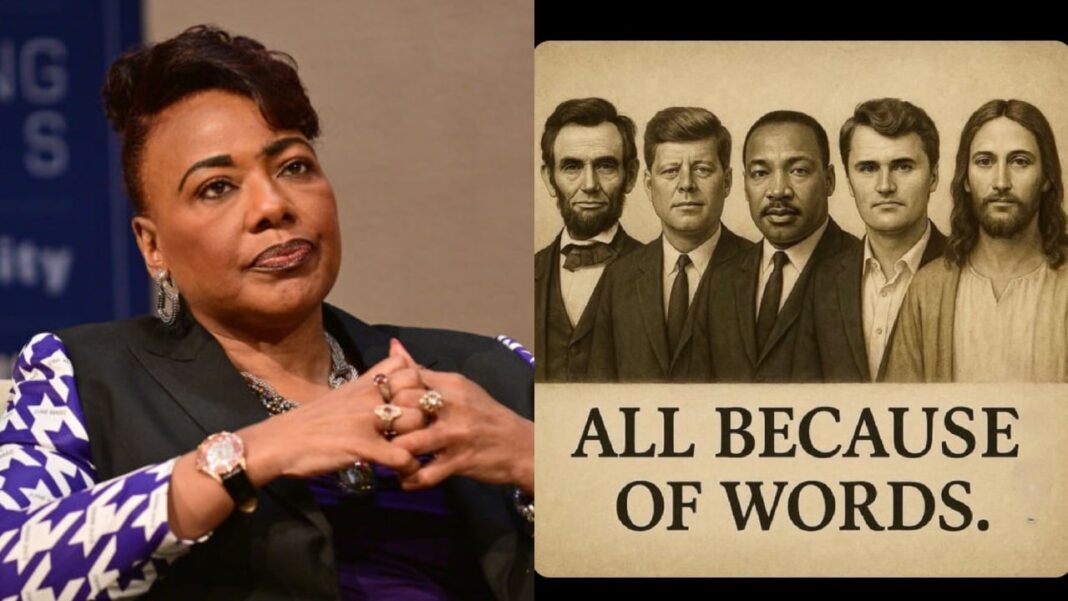Dr. Bernice King’s Response to Linking Her Father with Violence: A Unified Stand Against Misrepresentation
Dr. Bernice King, the youngest daughter of the iconic civil rights leader Dr. Martin Luther King, Jr., voiced her deep concern over a recent social media post that juxtaposed her father’s legacy with that of Charlie Kirk, a conservative influencer who was tragically killed. Rep. Anna Paulina Luna of Florida shared an image that featured a collage of figures, including Dr. King, Jesus, and former Presidents Abraham Lincoln and John F. Kennedy, under the headline: “All Because of Words.” In doing so, Luna drew a controversial parallel that has sparked outrage and dismay among many, including Dr. King.
Dr. King took to social media platform X to express her frustrations. She articulated the impact of such imagery, stating, “There are so many things wrong with this. So many. I get tired, y’all.” Her remarks resonate with those who fear the misuse of her father’s image in politically charged contexts, often diluting the profound legacy he left behind.
Notably, Dr. Bernice King was one of the earliest civil rights advocates to condemn the violence surrounding Kirk’s death. She extended her empathy towards his family, particularly his children and wife, expressing sorrow that they would have to face the reality of their father’s murder. “No child anywhere should lose a parent in such a hateful, callous way,” she commented, illustrating her compassion in the face of tragedy.
The Historical Context of Dr. King’s Legacy
Martin Luther King, Jr.’s own life was tragically cut short when he was assassinated at the Lorraine Motel in Memphis, Tennessee, while advocating for the rights of sanitation workers. His work centered around achieving equality through nonviolent means, emphasizing the importance of justice and peace over violence. Dr. Bernice King underscores this principle when she notes that merely referencing her father’s name is insufficient for societal evolution. “It will require much more than quoting my father for the United States to evolve from our current conundrum of multi-faceted violence, tragic apathy, and degrading policies,” she remarked.
Controversial Opinions and Their Implications
Kirk was known for stirring controversy with his opinions, including derogatory comments about Dr. King himself. In December 2023, he was quoted as saying, “Actually MLK was awful. OK? He’s not a good person.” This remark, followed by a retraction where he later referred to Dr. King as “a hero and a civil rights icon,” demonstrates the shifting narrative surrounding his views. His public engagements often touched on sensitive subjects, including gun violence, and culminated in his tragic death during a speaking event at Utah Valley University, where he engaged in debates on pressing societal issues.
While Dr. King did not respond directly to Kirk’s previous critiques, she focused her efforts on promoting non-violence and mature leadership in light of the aftermath of his death. Her calls for peaceful resolution and social justice serve as a reminder of her father’s teachings and the continuous struggle for equality.
Ongoing Misuse of Martin Luther King, Jr.’s Image
Dr. King has previously spoken out against the exploitation of her father’s image in various contexts, particularly those that trivialize his legacy. Earlier this year, she condemned a post by rapper Sexxy Redd, who shared an AI-generated image that featured her face-to-face with Dr. King. In her graceful response, Dr. King articulated her discomfort with the repurposing of her father’s image for entertainment, stating that such acts can feel deeply disrespectful.
Her poignant commentary captures the emotional weight carried by those who are tasked with carrying on their loved one’s legacy. “I earnestly wish that people would imagine what it would feel like to see their deceased, murdered father repurposed for party fliers, unjust legislation, etc.,” she noted. Such reflections highlight the burden faced by the families of revered figures, who grapple with the complexities of public perception and misuse of their legacies.
Reactions from the Public
Following Dr. King’s comments about the recent image, she received a wave of responses from supporters and critics alike. Many expressed understanding and empathy towards her frustration. One user wrote, “I don’t even know how you begin to understand—rationalize the feelings that she would probably be feeling with that image! My goodness I am sorry.” This response showcases the solidarity felt by many who recognize the damage caused by misrepresenting historical figures and their causes.
Dr. Bernice King’s thoughtful and passionate stand against the misuse of her father’s legacy serves not only as a reminder of the enduring impact of Dr. Martin Luther King, Jr.’s work but also calls for a more respectful and responsible engagement with the legacies of influential figures in today’s politically charged environment.



